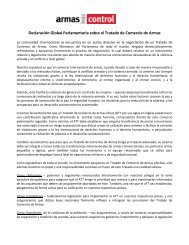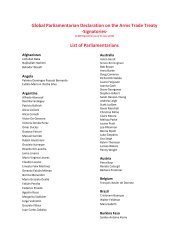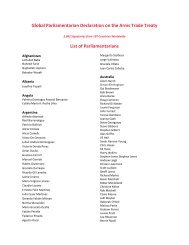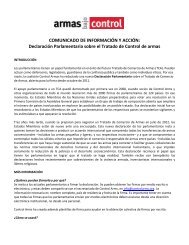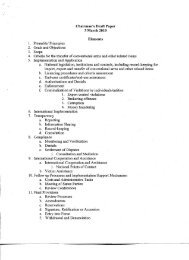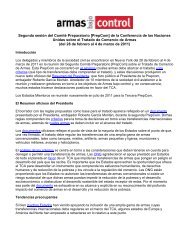Making it Work - Control Arms
Making it Work - Control Arms
Making it Work - Control Arms
- No tags were found...
You also want an ePaper? Increase the reach of your titles
YUMPU automatically turns print PDFs into web optimized ePapers that Google loves.
ivMAKING IT WORK: MONITORING AND VERIFYING IMPLEMENTATION OF AN ARMS TRADE TREATYIt is argued that the level of detail of reporting should allow accurate assessment ofinternational arms transfers. This would include the exchange of information by allstates parties on their international arms transfers to and from all counterparts, notjust other states parties. A Treaty inst<strong>it</strong>ution (such as an ATT Secretariat) should betasked w<strong>it</strong>h reviewing the data on international arms transfers provided by states.Information exchange: A variety of information exchanges among states partiescould be enabled under an ATT, thereby assisting them to meet Treaty obligations andto build confidence in the effectiveness of the regime. These could include:■ The exchange of information on international arms transfer licence denials. If a denialnotification requirement cannot be agreed at the outset, consideration should be givento provisions for voluntary exchanges or for the future development of a denialnotification mechanism.■ The exchange of information among states on ‘actors of concern’ w<strong>it</strong>hin the internationalarms transfer chain; this would allow a greater number of states to makeinformed decisions in the granting or refusing of international arms transfer licences.■ The exchange of information on diversion risks.Transparency: The paper argues that public support for an ATT would be best servedby openness and transparency w<strong>it</strong>h regard to contingent reporting and informationexchange activ<strong>it</strong>ies. Accordingly:■ States should be wary of allowing concerns about national secur<strong>it</strong>y and commercialconfidential<strong>it</strong>y to block transparency provisions under an ATT. Such concerns oftenrelate to the potential policies and activ<strong>it</strong>ies of other states. In reporting on theirinternational arms transfers under an ATT these concerns ought to be overcome.■ States should examine how to expand upon the level of information currently availableunder the UN Register in order to demonstrate that an ATT is being implementedfully. Information contained w<strong>it</strong>hin states’ annual reports on national implementationof an ATT should be made publicly available.An <strong>Arms</strong> Trade Treaty Secretariat: The paper argues that the fulfilment of substantivereporting, information exchange and transparency provisions under an ATTwill require the development of some dedicated inst<strong>it</strong>utional capac<strong>it</strong>y. In this regard,an examination of how such requirements have been met under other internationalregimes, particularly in s<strong>it</strong>uations where international trade data is collated andanalysed, points to the establishment of an ATT Secretariat as a potential solution.Such a body could service a number of functions central to the effective implementationof an ATT including inter alia:■ Collection and analysis of data on international arms transfers;■ Provision of support and guidance to state parties in the production of nationalreports and identification of gaps in capac<strong>it</strong>y for these ends;■ Providing a clearing house function w<strong>it</strong>h regard to requests for information on actorsof concern in the international arms trade;■ Acting as a repos<strong>it</strong>ory for and source of information on breaches of UN armsembargoes and on diversion risks;■ Acting as a repos<strong>it</strong>ory for denial notifications;■ Production of an annual report on the implementation of an ATT; and■ Matching capac<strong>it</strong>y-building needs by identifying sources of appropriate assistance.Treaty bodies: The paper pos<strong>it</strong>s that a key challenge for the arch<strong>it</strong>ects of an ATT willbe to establish inst<strong>it</strong>utions that can be tasked w<strong>it</strong>h, and are capable of, the effectivemon<strong>it</strong>oring and verification of state party compliance under a Treaty as well as thefuture development of the regime. A minimum requirement would be to establish a‘Meeting of States Parties’ alongside provision for a formal Treaty review every fiveyears. Beyond this, the experience from a number of other international regimes



